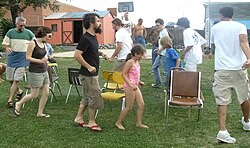Musical chairs
This article needs additional citations for verification. (February 2021) |
Musical chairs, also known as Trip to Jerusalem, is a game of elimination involving players, chairs, and music. It is a staple of many parties worldwide.
Gameplay
[edit]A set of chairs is arranged in a circle with one fewer chair than the number of players (i.e. nine players would use eight chairs). While music plays, the contestants walk around the set of chairs. When the music stops abruptly, all players must find their own individual chair to sit on. The player who fails to sit on a chair is eliminated.[1] One chair is then removed for the next round, and the process repeats until only one player remains and is declared the winner.
-
Before the game
-
Starting the game
-
Reducing numbers
-
Down to the last two
-
A winner!
History of the name
[edit]The origins of the game's name as "Trip to Jerusalem" is disputed. However, it is known to come from its German name Reise Nach Jerusalem ("The Journey to Jerusalem").[2] One theory suggests that the name was inspired by the Crusades, wherein several heavy losses were incurred. Another theory suggests that it was inspired by the Aliyah, the immigration of Jews from the diaspora to the Land of Israel, wherein it is stated that spaces on ships taking the Jews to the said land were limited. None of these theories have been officially confirmed.[3]
As metaphor
[edit]The term "playing musical chairs" is also a metaphor for describing any activity where items or people are repeatedly and usually pointlessly shuffled among various locations or positions. It can also refer to a condition where people have to expend time searching for a resource, such as having to travel from one gasoline station to another when there is a shortage. It may also refer to political situations where one leader replaces another, only to be rapidly replaced due to the instability of the governing system (see cabinet reshuffle).
In popular culture
[edit]The game is featured in the original incarnation of the Andrew Lloyd Webber musical, Evita, during the number "The Art of the Possible", wherein it serves as a symbolic metaphor of Juan Perón's rise to power. In this sequence, Peron and a number of military officers play the game, which the former wins.
The game is used on the lenten special of Sunday PinaSaya entitled "Trip to Jerusalem" aired on GMA Network in April 9, 2017. It featured the young girl Jessie (played by Barbie Forteza).
See also
[edit]- Buggins' turn
- Chinese fire drill
- Hot desking
- Level-coil
- Oh Sit!, a game show based on musical chairs
References
[edit]- ^ Orlick, Terry (2006). "No-Elimination Games". Cooperative Games and Sports: Joyful Activities for Everyone. Human Kinetics. p. 21. ISBN 9780736057974.
- ^ Team, Gamesver (2022-02-23). "History of Musical Chairs (Game) - Origins, Meaning, Metaphor,…". Gamesver. Retrieved 2023-10-12.
- ^ Diehl, Katrin (2015-09-07). "Die Reise nach Jerusalem". Jüdische Allgemeine (in German). Retrieved 2024-11-17.






